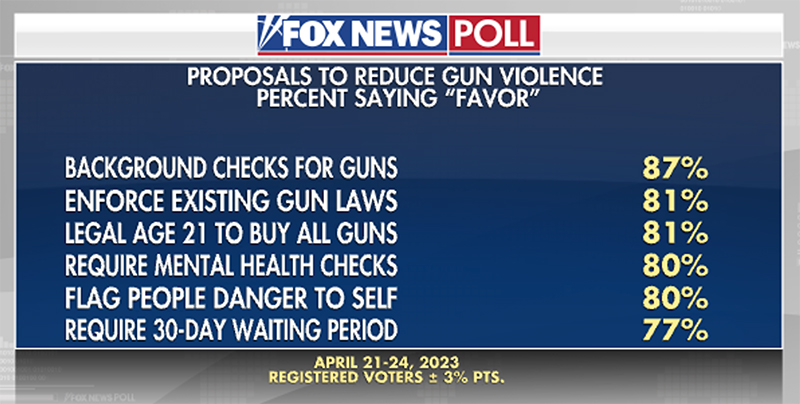Volcanoes are erupting in The Philippines, but on-fire Australia received some welcome rain. The Iran war cries have been called off and The Donald’s military powers are about to be hamstrung by the Senate. Meanwhile, his impeachment trial is starting, and we’re all on Twitter for a front-row seat.
What Could Go Right? The Swiss cheese method for reducing gun violence
A multi-layered strategy for team red and team blue, and everyone in between
This is our weekly newsletter, What Could Go Right? Sign up here to receive it in your inbox every Thursday at 6am ET. You can read past issues here.
The Swiss cheese method for reducing gun violence
One of the most common reader emails The Progress Network (TPN) receives asks for updates on progress around gun violence in the United States and ideas for what we can do about it as individuals. I’d like to offer two strategies, one for team blue and one for team red. Don’t confine yourself by the labels, though. Parts of team blue might also like the team red strategy, and vice versa. And many of us are on team purple, anyway.
Neither strategy is perfect, but both offer possibilities that are acceptable to wide swathes of the American public and get at different parts of the issue. We can also start from the most basic of points, which is that all of us want less gun violence. Let’s not forget that in our heated debate over it.
Team blue:
It’s not Dylan Mulvaney and other culture war conflicts but poor government leadership, pocketbook issues, immigration, and guns that Americans have top of mind, according to a new poll from Gallup. We are united not only over our gun concerns but also over the changes we would like to see regarding them. A recent Fox News poll found that voters approve many gun measures:

The least supported measure, which is not on the image, is banning the sale of assault rifles and semi-automatic weapons. It still cleared majority support, though, with 61 percent of voters.
Bans are one option that dominantly blue states are increasingly taking. Washington became the tenth state to ban the sale of assault rifles last week, although the bill must withstand legal challenges to hold. (An Illinois ban passed in January is currently in limbo in the court system.)
Colorado (once purple, now blueish) also passed four gun bills last week that fall pretty neatly onto the gun limits the Fox News poll respondents support by wide majorities. They:
- Raise the minimum age to buy firearms from 18 to 21
- Expand “red flag” laws to allow a wider swathe of people—educators, health care professionals, and district attorneys—to request a person’s gun be seized
- Introduce a three-day waiting period
- Repeal limitations on gun violence victims’ ability to sue firearm and ammunition manufacturers
“Another bill to ban the sale of ghost guns—used in both the Club Q and an East High School shooting—is expected to pass later this legislative session,” Axios reports.
Team blue, you can contact your state representative to back any of these laws if your state has not yet passed them. These are the states that passed new gun laws in 2022.
Team red:
For red states deeply uninterested in the legislative route, there are things that could cut down on gun deaths that don’t include bans or mandates.
One is improving gun storage habits. Vox reports that “54 percent of the approximately 77 million gun owners in the US do not practice safe gun storage,” according to a 2018 survey from Johns Hopkins. The Vox piece mostly focuses on secure storage laws, but proper gun storage could also be taken up as a public health conversation the way that smoking has been.
Another is the use of smart guns. These guns, which only fire for authorized users based on facial and/or fingerprint recognition, are now on sale for the first time in the United States. The idea for smart guns has been around since the early 2000s, but never came to fruition due to National Rifle Association and gun owner blowback, in addition to the simple fact that the guns didn’t work. Big gun manufacturers gave up on making them.
But the new guns from smart gun company Biofire, if reporter reviews are accurate, do work. Next is to see whether anyone wants to buy them. Biofire’s founder and CEO, Kai Kloepfer, has been working on the company’s product since he was 15 years old, when the Aurora, Colorado mass shooting occurred, near where he grew up. Now 26, he’s hoping the gun could prevent deaths from accidents, homicides, suicides (which make up over half of all annual gun fatalities), and theft. He seems to have the right ideas when it comes to marketing, approaching gun influencers and openly opposing government mandates around smart guns, which have been nonstarters for gun owners in the past.
Team blue + team red = Swiss cheese:
These strategies could be put together in the Swiss cheese method of public health, a concept I took from TPN Member Nicholas Christakis, who used it on our podcast to describe pandemic response mechanisms. One mechanism—let’s say testing—is like one piece of Swiss cheese. A lot will leak through the holes of that one layer if our only pandemic response was to test. But if we keep layering slices of Swiss cheese on top of one another—vaccination, masking, quarantining, and so on—eventually, all the holes will be covered by other slices. And even if some of the holes remain open, the more layers, the less leakage.
So storage is one slice in the Swiss cheese method of reducing gun violence. Smart guns are another. (One investor in Biofire, Michael Corbett, a former Navy SEAL, became interested in the company when his 9-year-old unlocked his gun safe, which just proves the multi-layering point.) For those in blue states—and potentially for those in purple and red states, if there is wide agreement—laws of various kinds are yet another.
No layer by itself will solve the issue. But each layer is useful.
Quick hits
🤖 Concerns abound over artificial intelligence (AI). Those are valid, and we explore some this week on the What Could Go Right? podcast with TPN Member Baratunde Thurston. But there are also many areas where AI will likely prove enormously helpful—here are 40 of them. AI is already helping to spot cancer earlier and map every tree in Africa. Thurston, too, talks on the podcast about how AI helped him decipher his health insurance plan.
🇮🇳 There are two countries going through economic transformations that we would be wise to pay attention to: Poland and India. Especially India. Morgan Stanley forecasts that India’s economy will be the third largest in the world by 2027, after the US and China. In an emerging multipolar world, that is not something to sniff at. The two links above are chock-full of information about the changes India is currently going through, and TPN Member Fareed Zakaria has even more on India’s growing digital savviness here.
🚀 Things I didn’t expect to read this week: “A group of scientists are exploring what sex in space will be like.” Sadly, it’s not at all what that sentence sounds like—it’s simply encouragement from a group of scientists for the community to figure it out, since space tourism will likely lead to coitus and impregnation in space, and we don’t know if there are any risks.
Below in the links section, an electric road, a geothermal apartment complex, supersonic civilian aircraft, and more.

Stockholm has launched the world’s first self-driving electric passenger ferry. As part of a project aimed at making urban mobility more sustainable, the ferry has a capacity of 25 people and will run with 15 hours of continuous electric operation daily.
Artificial Unintelligence | S4 E12

Is technology moving us forward or backward? What is the human cost of progress? And is artificial intelligence making people more divided, or can it help us find common ground? Comedian, commentator, and author Baratunde Thurston joins us to talk about how technology and humanity are sometimes at odds and sometimes companions. | Listen to the episode
Progress, Please
(Found good news? Tweet at us @progressntwrk or email.)
Other good stuff in the news 🐤
Energy & Environment:
- ‘Explosive’ growth means one in three new cars will be electric by 2030, IEA says | Carbon Brief
- Sweden is building the world’s first permanent electrified road for EVs to charge while driving | Euronews
- Fertilizer manufacturers strive to curb greenhouse gas emissions | Financial Times
- Fourth generation nuclear reactors take a big step forward | Forbes
- Trash interceptor weathers the storms, sparing Pacific from thousands of pounds of garbage | Los Angeles Times
- A massive geothermal apartment complex is going up in Brooklyn, the first of its kind | CNBC
- The clean energy milestone the world is set to pass in 2023 | BBC
- Ocean census aims to discover 100,000 previously unknown marine species | CNN
- Cryptocurrency Ethereum has slashed its energy use by 99.99% | New Scientist
Public Health:
- US adult cigarette smoking rate hits new all-time low | AP
- Powerful new obesity drug poised to upend weight loss care | AP
- GSK’s RSV vaccine first to get EU regulator’s nod | Reuters
- Japan approves abortion pill for the first time | The Guardian
- US reports no new mpox cases for first time since outbreak began | CBS News
Science & Tech:
- New tech to slash organ transplant waiting lists | proto.life
- Two-component system could offer a new way to halt internal bleeding | MIT News
- NASA aims to end a 50-year old ban on supersonic civilian aircraft in the US | Interesting Engineering
- New technology could save billions of male chicks’ lives | Vox
Politics & Policy:
- EU lands jet-fuel deal to start decarbonizing air travel | Bloomberg
- Germany sets new standard for cheap, national mass transit | Bloomberg
- US eyes geothermal energy to heat and cool homes with low climate impact | CNN
- Abortion bans fail in South Carolina and Nebraska | The New York Times
- Here’s what the PUMP Act does for lactating parents | The 19th
Society & Culture:
- 7 facts about Americans and marijuana | Pew Research Center
- Women are almost half of US lieutenant governors. Could it pave the way to higher office? | The 19th
- Why are there fewer serial killers now than there used to be? | Phys.org
- The Cook Islands have decriminalized homosexuality | LGBTQ Nation
- Ugandan lawmakers pass new version of tough anti-gay bill | Africanews
Economy:
- 10 years after Rana Plaza, is Bangladesh’s garment industry any safer? | CNN
- This really doesn’t look like a recession | Axios
- Nurses flock back to hospitals after leaving in the pandemic | The Wall Street Journal
TPN Member originals 🧠
(Who are our Members? Get to know them.)
- Will the US be weaker in 2050 than today? | James Pethokoukis
- The next level of AI is approaching. Our democracy isn’t ready. | Danielle Allen
- Can the Capitol hold a much bigger House? Yes, here’s how it would look. | Danielle Allen
- Be kind, and be happier | Arthur C. Brooks
- AI could spell the end of big business | Tyler Cowen
- The gender pay gap is not a myth, it’s math | Richard Reeves
- The fragile beauty of male friendship | Richard Reeves
- Why do our politics feel so backwards? | Andrew Yang
- Ed Luce on an America—and a world—divided | Yascha Mounk
- Transgender biology debates should focus on the brain, not the body | Jennifer Finney Boylan
- MSM’s latest freakout over Afghanistan withdrawal | Robert Wright
- More courage, less fear: Don’t fight “cancel culture” by exaggerating its power | Matthew Yglesias
- In an age of AI and drones, land mines are still killing | Bina Venkataraman
- Biden’s vaccine project needs to be more like Operation Warp Speed | Alec Stapp
Department of Ideas 💡
(A staff recommendation guaranteed to give your brain some food for thought.)
Gun Violence Is Actually Worse in Red States. It’s Not Even Close. | Politico
America’s regions are poles apart when it comes to gun deaths and the cultural and ideological forces that drive them.
Why we picked it: Once again, the headline was written for clicks. But what follows is a fascinating look into America’s nine (or eleven, depending on how specific you want to get) regional cultures, which have wildly different traditions and attitudes around guns. Understanding those cultures first is key to building coalitions around gun reform, says the author. —Emma Varvaloucas
Until Next Time
Some parrots tell us where we are, others teach us how to be less lonely. 🦜


